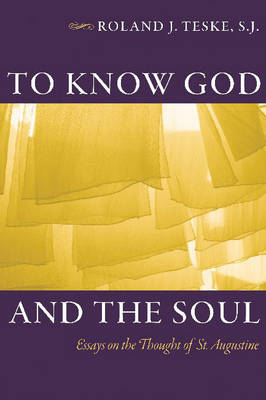Early Christian Studies
1 total work
"To Know God And The Soul" presents a collection of essays on Augustine of Hippo written over the past twenty-five years by renowned philosopher Roland Teske. They reveal Teske's principal interests in Augustine, especially Augustine's discovery of a spiritualist metaphysics in the philosophy of Plotinus that allowed him to break away from Manichean and Stoic corporealism so that he could conceive of God as incorporeal and non-temporal and of the soul as incorporeal. Augustine's assimilation of Plotinian thought as a means of understanding Catholic Christianity provided key answers to some of the problems that he had had with the Christian faith, but it also led to other problems because some aspects of Platonism were incompatible with the Christian faith, as can be seen in Augustine's early account of the love of neighbor and in his understanding of the motive of creation.The articles focus on Augustine's philosophical thought and language about God, his argument for the existence of God, properties of God such as his substantiality and immutability, the creation of the world in time along with the question raised by the Manichees about what God was doing before he created the world.
They tie the definition of time in the Confessions to the concept of a world-soul, which Augustine held at least in the years up to the Confessions. They offer an explanation of the unity of the Confessions, especially through an appeal to Augustine's interpretation of the heaven of heaven, and point to the salvific role of Christ who, according to Augustine, came to free us from time and make us eternal.In addition to a short general introduction, each of the articles is accompanied by a brief reflection in which the author has followed the bishop of Hippo's lead by providing a retractatio, in which he reexamines the articles from his present-day perspective.
They tie the definition of time in the Confessions to the concept of a world-soul, which Augustine held at least in the years up to the Confessions. They offer an explanation of the unity of the Confessions, especially through an appeal to Augustine's interpretation of the heaven of heaven, and point to the salvific role of Christ who, according to Augustine, came to free us from time and make us eternal.In addition to a short general introduction, each of the articles is accompanied by a brief reflection in which the author has followed the bishop of Hippo's lead by providing a retractatio, in which he reexamines the articles from his present-day perspective.
